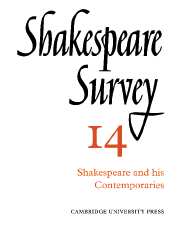Book contents
- Frontmatter
- Studies in Elizabethan and Jacobean Drama since 1900
- Shakespeare and Lyly
- Shakespeare and Mundy
- Marlowe as Provocative Agent in Shakespeare’s Early Plays
- The Tragedy of Revenge in Shakespeare and Webster
- The Simplicity of Thomas Heywood
- The Tragic Vision of Fulke Greville
- Shakespeare v. The Rest: The Old Controversy
- Shakespeare’s Gentleness
- Milton on Shakespeare
- An Unrecorded Elizabethan Performance of Titus Andronicus
- Stratford-upon-Avon a Hundred Years Ago
- International Notes
- Shakespeare Productions in the United Kingdom: 1959
- Three Directors: a Review of Recent Productions
- The Year's Contributions to Shakespearian Study 1 Critical Studies
- 2 Shakespeare’s Life, Times and Stage
- 3 Textual Studies
- Books Received
- Index
- Plate section
Shakespeare v. The Rest: The Old Controversy
Published online by Cambridge University Press: 28 March 2007
- Frontmatter
- Studies in Elizabethan and Jacobean Drama since 1900
- Shakespeare and Lyly
- Shakespeare and Mundy
- Marlowe as Provocative Agent in Shakespeare’s Early Plays
- The Tragedy of Revenge in Shakespeare and Webster
- The Simplicity of Thomas Heywood
- The Tragic Vision of Fulke Greville
- Shakespeare v. The Rest: The Old Controversy
- Shakespeare’s Gentleness
- Milton on Shakespeare
- An Unrecorded Elizabethan Performance of Titus Andronicus
- Stratford-upon-Avon a Hundred Years Ago
- International Notes
- Shakespeare Productions in the United Kingdom: 1959
- Three Directors: a Review of Recent Productions
- The Year's Contributions to Shakespearian Study 1 Critical Studies
- 2 Shakespeare’s Life, Times and Stage
- 3 Textual Studies
- Books Received
- Index
- Plate section
Summary
Shakespeare’s own attitude to his professional rivals was one of astonishing modesty, if we may take seriously his despondent description of himself as
Desiring this man’s art and that man’s scope.
By the time he had written this, however, in his early thirties, when Francis Meres published his Palladis Tamia, Shakespeare is already firmly among his contemporaries:
These are our best for Tragedie, the Lorde Buckhurst, Doctor Leg of Cambridge, Doctor Edes of Oxforde, Maister Edward Ferris, the Authour of the Mirrour for Magistrates, Marlow, Peele, Watson, Kid, Shakespeare, Drayton, Chapman, Decker, and Beniamin Iohnson.
And on the next page we read:
The best for Comedy amongst us bee, Edward Earle of Oxforde, Doctor Gager of Oxforde, Maister Rowley once a rare Scholler of learned Pembrooke Hall in Cambridge, Maister Edwardes one of her Maiesties Chappell, eloquent and wittie Iohn Lilly, Lodge, Gascoyne, Greene, Shakespeare, Thomas Nash, Thomas Heywood, Anthony Mundye our best plotter, Chapman, Porter, Wilson, Hathway, and Henry Chettle.
Such was the race-card towards the end of the sixteenth century, and it is by no means clear who are the favourites—though the increasing publication of Shakespeare's writings during the next few years shows where the reading-public was beginning to put its money. And by the time that The Return from Parnassus is written (in which Shakespeare's name appears among half a score of candidates for fame) it is possible to express stronger opinions. There, Kemp and Burbage are talking and give their point of view:
Why heres our fellow Shakespeare puts them all downe I and Ben lonson too.
- Type
- Chapter
- Information
- Shakespeare Survey , pp. 76 - 89Publisher: Cambridge University PressPrint publication year: 1961

